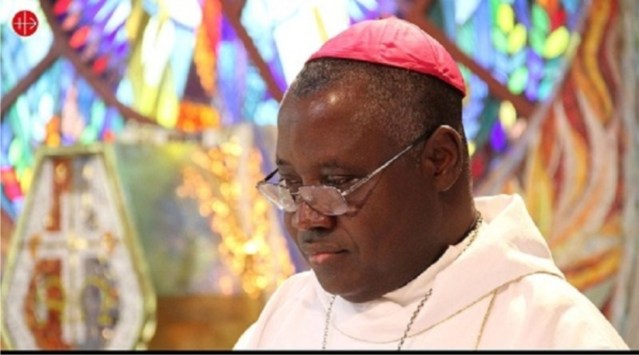A Fulani herdsman and a Jukun Kona farmer at Yawai Abbare in Jalingo Local Government of Taraba State, Nigeria were said to be at the root of the conflict which started on the 6th of May, 2019 and lasted for more than a month, degenerating so badly that at the end of it the Jukun Kona counted their losses and documented the attack and burning of 18 villages, the killing of 65 persons and the displacement of over 9,000. Fifteen (15) Churches, two primary schools and a health care centre were also destroyed.
This information was given by the Co-Adjutor Archbishop of Abuja and Apostolic Administrator of Jos Archdiocese Nigeria, Monsignor Ignatius Ayau Kaigama in a message made available to Aid to the Church in Need.
He said that the extent of damage suffered by the Fulanis is not fully known to him but added that they too must have suffered the loss of animals, homes and dear ones especially during the attack launched on the Kona village of Janabanibu where both parties suffered casualties.
“It beats my imagination that in Nigeria when there is a misunderstanding, people tend to vent their anger and frustration on places of religious identity and worship, trying to give what is a social conflict a religious coloration. This is reprehensible. It is surprising too that those who claim to be “believers” would destroy places of worship and even take lives without the slightest compunction.”, he lamented.
The Archbishop recalled that this Fulani/Kona crisis seems to be a replication of the event of the 1890s between the Jukun Kona people and the Fulani in Jalingo. This he said, has unfortunately escalated and worsened the relationship between these two tribes.
Something must therefore be done urgently and fairly to bridge the gap and heal the historical wounds. Genuine justice and reconciliation must be pursued and there is need to establish a Truth and Reconciliation Committee to get to the root of this matter, he suggested.
“Following the hostility between the Fulani herdsman and the Kona farmer on the 6th of May, houses began to burn, gunshots rang out like fireworks, gunmen mounted on motorcycles were shooting indiscriminately at anyone they perceived was an enemy. What people thought was a simple misunderstanding that could be easily resolved became frighteningly serious. The violence went on unchecked for a protracted period and the population of Internally Displaced People (IDPs) began to swell because of the increasing attacks of the gunmen.”, he explained.
Msgr Kaigama who comes from the Jukun Kona minority ethnic group explained that when he heard about the helplessness of the people, he was impelled to contact security personnel and top government officials for their intervention.
He however expressed disappointment at the negative response he received from some of them.
“Of all the people I telephoned, it was the not so polite response, reaction and attitude of the Deputy Commissioner of Police in Taraba State in charge of operations that surprised me the most. In my nineteen years as the Catholic Archbishop of Jos, I have had a good working relationship with all the Police Commissioners, GOCs, SSS Directors, Civil Defence Commandants, Commanders of Operation Safe Havens posted to Plateau State, to the point that not too long ago after successfully working together to avert what would have been a great crisis and bloodshed in Jos, I invited them to my residence where we shared ideas, because of their commendable cooperation with the Church. Each time there was a new senior security officer in Jos they visited my office or we met at dialogue fora, such as the Dialogue, Reconciliation and Peace (DREP) Centre which I founded in Jos in 2011.”
On a positive note, he commended the response of the Vice President of the Country, Prof. Yemi Osinbajo who listened to him and promised to act.
“I believe that my asking the Vice President to intervene led to the pronouncement by President Buhari on the 20th of June that Kona land and its people should be protected. Through his Senior Special Assistant on Media and Publicity, Garba Shehu, the President condemned the attacks on the Kona people and warned that attacks on innocent people, in the name of revenge, or whatever motives, would not be tolerated by government. By God’s grace, there was some measure of peace.”, he said.
“Only guerilla attacks now take place as farmers who attempt farming their farmlands are killed”, he continued, “Three persons were killed the morning of my visit of 10th July.”
According to the Archbishop, the big question is: After the return of peace, what next? The people are displaced, no homes to return to, no farming activity possible, etc. Again, there is the anxious fear that the attacks could erupt again.
He added that biased and prejudiced official security reports heighten tension when they blame the victims instead of the aggressors because of the Nigerian “factor” of tribal or religious affiliation.
This sadly keeps the fire of the crisis raging. Generally, it is when the militant herdsmen vanish after their deadly attacks that the poor villagers try to react to protect or defend themselves. They often end up being the ones apprehended and detained and tortured as in the case of the Kona youths.
Msgr Kaigama prayed that the President will ensure that both Fulani and Kona people are safe and treated equally and hopefully and will have the same commitment to resolve the differences between herdsmen and farmers raging in different parts of Nigeria.
May God answer our prayers and pour in abundance His peace upon us all in Nigeria, so that the much-desired development and progress will become our middle name instead of destruction and killings, he concluded.





